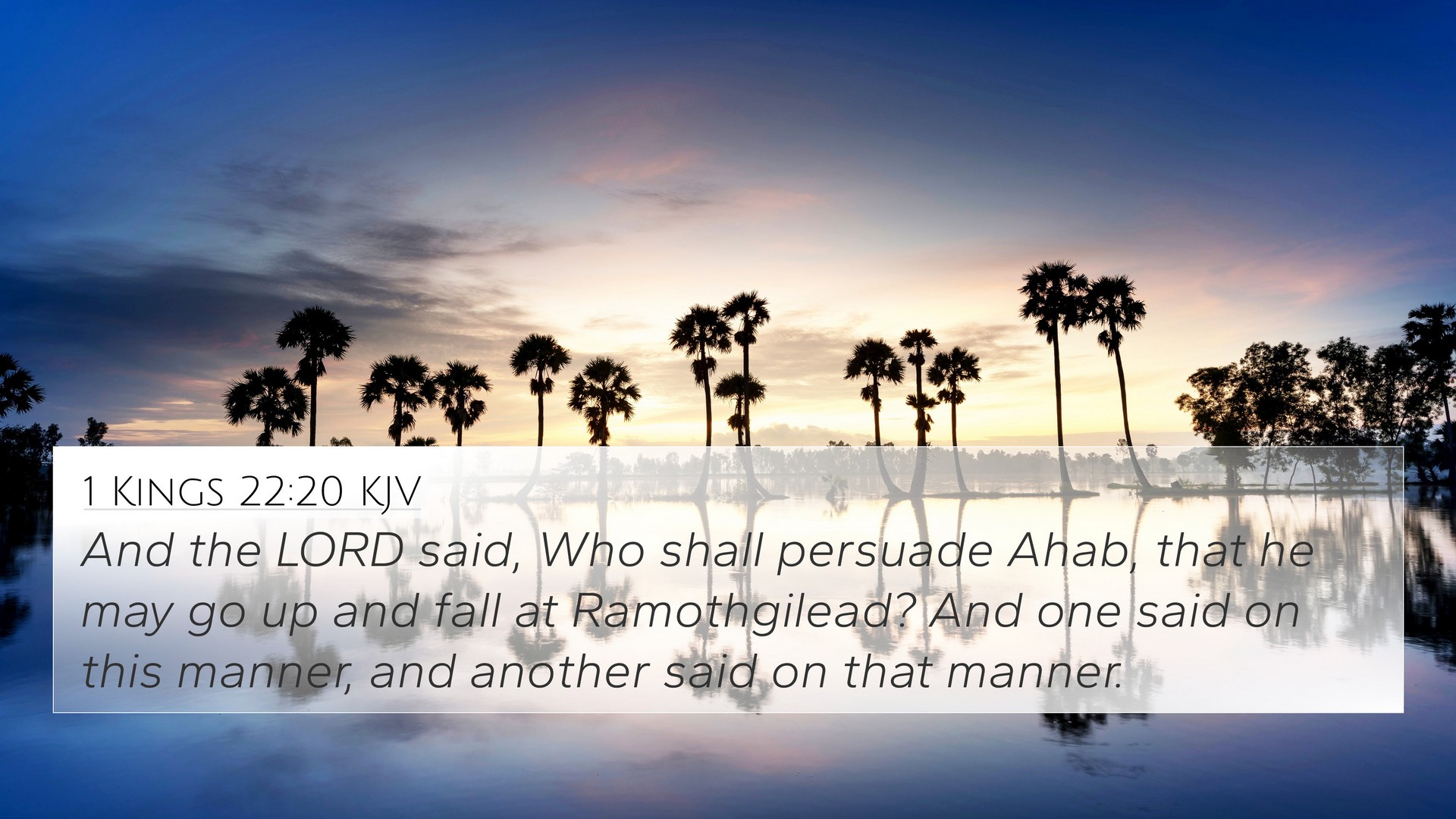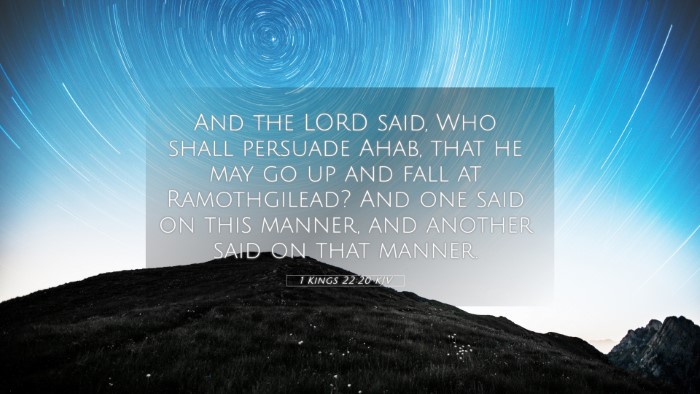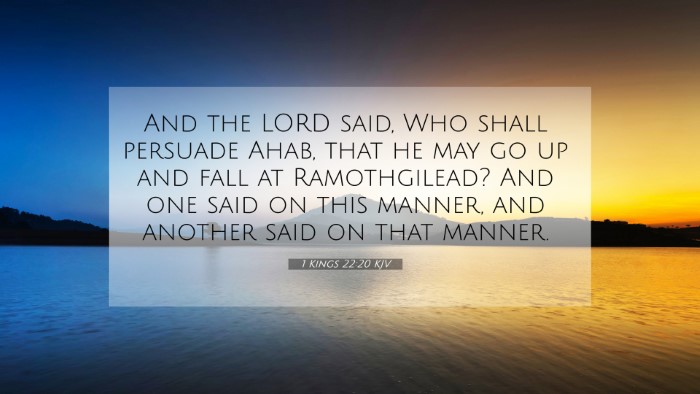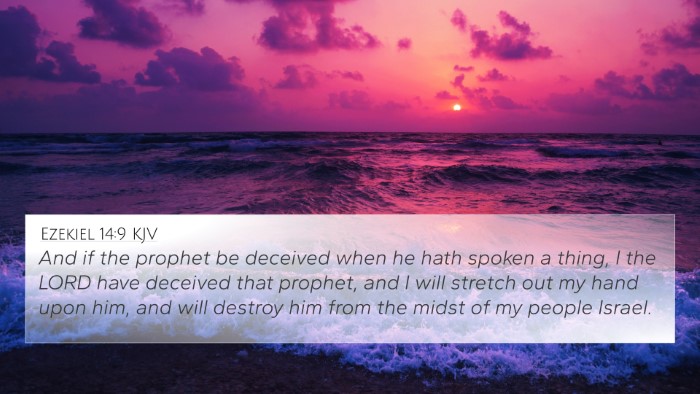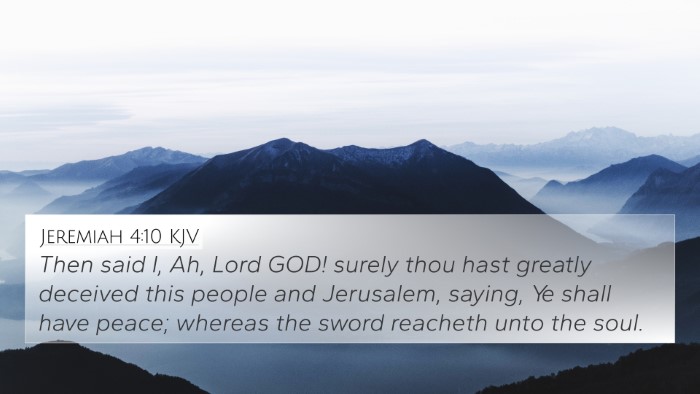Understanding 1 Kings 22:20
1 Kings 22:20 presents a profound moment in the Biblical narrative, where God allows His will to be carried out through prophetic voices. This verse states:
"And the Lord said, Who shall persuade Ahab, that he may go up and fall at Ramoth-gilead? And one said on this manner, and another said on that manner."
The significance of this verse can be unpacked through various public domain commentaries such as those by Matthew Henry, Albert Barnes, and Adam Clarke. Collectively, they provide a multi-faceted understanding of the text.
Key Insights from Commentaries
-
Divine Will and Agency:
Matthew Henry emphasizes that this passage highlights God's sovereignty. He notes that God is seen orchestrating events and allowing His plan to unfold through various means, including the decisions made by spiritual beings and individuals.
-
Prophetic Mechanism:
Albert Barnes mentions that the exchange reflects a divine counsel where God deliberates among heavenly beings about the fate of Ahab. This introduces the concept that God providentially governs human history, using both angels and prophets as instruments of His will.
-
Human Responsibility:
Adam Clarke underscores the aspects of human choice and accountability. Despite God’s sovereignty, Ahab's decisions lead him to his demise, revealing that while God’s plans prevail, humans are responsible for their choices and consequences.
Cross-References for Deeper Understanding
To appreciate the thematic connections present in 1 Kings 22:20, we can look at several related scriptures:
- 2 Chronicles 18:20-22: A similar account detailing the prophetic response to Ahab's inquiry.
- Isaiah 6:8: Insights into God's sending of prophets and His active engagement in human affairs.
- Jeremiah 14:14: Reflections on false prophets versus true divine messages.
- Ezekiel 14:9: God's role in allowing deception when people turn from Him.
- Romans 1:24: The concept of God giving people up to their sinful desires as a result of their choices.
- Matthew 10:16: Christ's instruction to be wise as serpents and innocent as doves in a corrupt world.
- 1 Thessalonians 5:20-21: The call to test prophecies and hold onto what is good.
Thematic Bible Verse Connections
This verse invites reflection on various themes within the Bible, particularly the interplay between God’s sovereignty and human choice. Through careful cross-referencing Biblical texts, one can understand the multifaceted nature of God's will in the lives of His people, evident in both Old and New Testament scriptures.
-
God's Sovereignty: A recurring Biblical theme that emphasizes that despite human actions, God's dominion remains unchallenged (Psalm 103:19).
-
Prophecy: The role of prophets as communicators of God's will (Ephesians 4:11-12).
-
Judgment and Mercy: Understanding God's justice in the context of His mercy (Romans 11:22).
Comparative Bible Verse Analysis
The verse invites a comparative study of how God communicates and directs throughout Scripture. It challenges the reader to look for Bible verses that relate to each other and identify patterns in God's dealings with humanity.
For those engaged in cross-referencing Bible study, tools like a Bible concordance or a Bible cross-reference guide can help identify these connections and deepen one’s understanding of Scripture.
Links Between Prophetic Messages
Understanding the links between the Prophets and Apostolic teachings offers insights into the continuous dialogue within the Scriptures. For instance, the prophetic foresight in 1 Kings foreshadows New Testament themes where God’s plan unfolds through Christ (Luke 24:44).
Conclusion
1 Kings 22:20 serves as a reminder of the deep intricacies in the Biblical narrative where divine sovereignty and human agency converge. By exploring this verse with a focus on its connections and themes through comprehensive Bible cross-reference materials, one can gain a richer understanding of God’s word and its application in our lives today.
